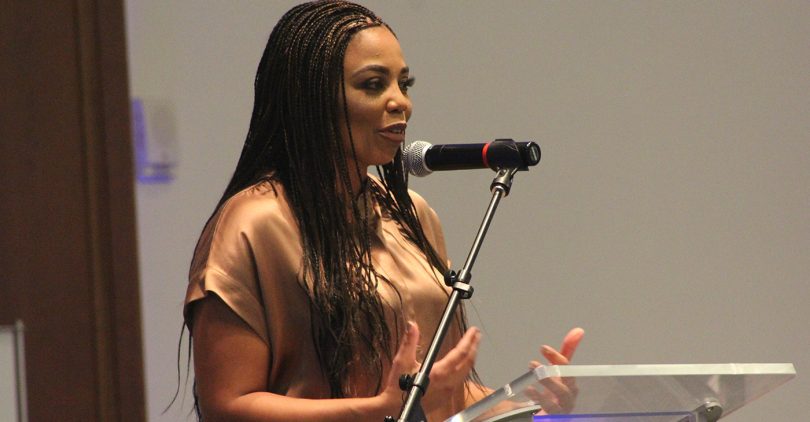
By Dr. Sybil C. Mitchell, Special to The New Tri-State Defender
There was no way the University of Memphis Journalism Auditorium was going to hold the crowd waiting to hear TV sports journalist and political lightning rod, Jemele Hill speak about the First Amendment. A quick shift to the University Center Ballroom solved that problem.
Despite a very public and controversial departure from ESPN, Hill brought the smoke. Hill is no shrinking violet and she continues to tell it as she sees it. She was engaging, unapologetic, and still controversial – a full-fledged champion of the First Amendment.
Hill was featured at this year’s Annual Norm Brewer First Amendment Lecture. She had famously tested the limits of the First Amendment while at ESPN when she tweeted that President Trump was “a white supremacist who surrounded himself with other white supremacists.” The White House called for her immediate dismissal.
But it was a separate Twitter post that sealed her fate. Hill blasted Dallas Cowboys owner Jerry Jones, who told his players that anyone who kneels would not play. Hill said Jones had put African-American players in a difficult position, adding, “Change happens when advertisers are impacted. If you feel strongly about JJ’s statement, boycott his advertisers.”
Given that ESPN broadcasts NFL games, network executives bought out her remaining $2.5 million contract to end the relationship.
“I could have stayed, but I knew it was time to go,” she said. “And they knew it was time for me to go. That’s just what it was.”
On Tuesday, Hill took on every subject, no holds barred. Students asked pointed questions and she answered them all without hesitation. Hill expressed concern for the direction journalism is going and urged students to push themselves.
“I am deeply concerned about journalism in this era,” she said. “It concerns me when being educated and well-read is called ‘being an elitist.’ I am disturbed when being dumb and not well-read is more desired.
“When I was in college, I did not read one book that was not assigned,” Hill continued. “Before college, I read everything. After college, I read. But while I was in college, I didn’t push myself, and I should have. Push yourself to be the best. Don’t just do enough to get by. Push yourself.”
When asked about the public’s right to know the details of Colin Kaepernick’s settlement with the NFL, Hill had this to say about “Kaep:”
“We do not have the right to know about his settlement because it was a labor issue,” she said. “Kaep defeated the NFL. He kneeled to protest the continuous killing of black men and boys. They blackballed him from the league, conspiring to shut him out.
“The NFL is known for pummeling people in court, but when they dealt with Kaep, they had to write a check. We don’t need to know the details because it was a labor issue. Kaep won. That’s all we need to know,” she said.
Some students expressed the desire to excel in sports journalism as “black women.” Hill told them that the career path comes with hate mail and death threats. “It comes with the job. You have to deal with it. That’s just how it is.”
Hill found life after ESPN at The Atlantic monthly print and digital news organ. Her political commentary, no matter how controversial, is widely celebrated.
“I like being at The Atlantic,” she said. “I’m a lot less apologetic. I’m sort of all out of apologies.”
Hill was named the 2018 “Journalist of the Year” by the National Association of Black Journalists.
The Norm Brewer First Amendment Lecture at the University of Memphis was founded by Professor Otis L. Sanford, author, columnist, TV commentator and holder of the Hardin Chair of Excellence in Journalism. This was the lecture’s eighth year.
The event is named for Brewer, a political analyst and news commentator in Memphis – first at WMC-Channel 5 and later at WREG-Channel 13. Brewer passed away in 2010 at the age of 76.
“I think Jemele presented an appropriate message at a time in our society where women are speaking out, mobilizing, challenging the status quo and moving into more positions of authority and power than ever before,” Sanford said.
“Her comment that journalists should be disruptors is spot on. And I was thrilled to have her appear before such a warm and receptive audience. The UofM is a place that fosters relevant dialog and encourages critical conversations. Jemele’s lecture was an ideal example of that.”


